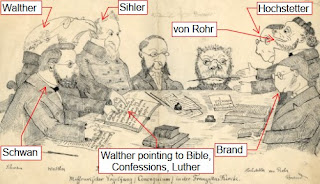Some quotes from Chapter 9: (256-278)
258: "the Pope, the head of the sectarians, being in the church, has his seat in the temple of God, as Luther in his writing against Hans Wurst proves"
259: Grabau's false teaching: "The Church does not have the highest and last judgment or the keys directly, but only insofar as it has the office of the Ministry that guides the Confessions, that is, that the highest and last judgment is given only to those in the holy ministry."
261: Pastors "are not special, privileged priests… The public preaching Ministry, however, is not transferred by the congregation or church, but by God only through the congregation or church"
263: "If, otherwise, the doctrine of justification by faith in Jesus Christ alone is to be right, then, as Luther says, our faith and sacrament need not stand on the (administering) person, whether pious or evil, consecrated or unconsecrated, called or crept in, the devil or his mother."
264: "If the Word of God were no longer powerful and sufficient in itself to work the saving faith, then our salvation would be bound to a human person… a fundamental article of the Christian faith"
265: Luther on the Ban: "Thus a Christian congregation is not the maidservant of the official, nor the jailor of the bishop… the congregation shall be judge and mistress." [Luther was a "Missourian".]
265: von Rohr on the Ban: "our ordinance now comes into effect, namely, that the ministry has jurisdiction" — Walther: "your doctrine is strictly against the symbols and Luther."
266: "When we say that the congregation has to judge, we (here) understand congregations not with exclusion but with inclusion of the pastor."
267: "But a ban that is imposed with exclusion of the hearers is according to Luther a sh… ban [Scheisbann (WA), or Scheißbann (W2): "shit ban"], i.e. not the ban that Matt. 18 is talking about… Luther says: “The congregation, in dealing with one of its members who is under the ban, should be sure of the reason it thinks him to be deserving of excommunication."
268: Missouri: "In matters of doctrine and conscience, the majority of votes does not apply, but only the Word of God."
270: "church discipline cannot and must not begin with every sin"
272: "it follows from the Word of the Lord, Luke 10:16, how precisely the authority of his servants [the pastors] is limited."
273: Luther: "Pastors must not pretend that the people are under them."
274: Luther: "If they [bishops] also want to apply force, and compel us to do so, we must not obey, nor consent to it, but rather die."
274: "Pastor Grabau had declared ordination for a commanded divine ordinance, which was under divine and apostolic command. [The same as LCMS Prof. David Scaer.] … the Smalcald Articles say [Tr 70]: 'The ordination (ordinatio) was nothing else (nil nisi) than such a ratification.' which is repeated by Chemnitz and the other pure teachers" [Scaer refuted by Confessions]
Images of some men appearing in Chapter 9: (256-278)
 |
| Walther ——— Schwan ——— Sihler ——— von Rohr —— P. Brand —— Hochstetter |
 |
| See full size version at CHI website here. |
A somewhat humorous cartoon drawing of this Colloquy was made by a Pastor Ruhland and was published by Concordia Historical Institute in "Pieces of Our Past No.50" March 28, 2014. Although the Missourians, on the left, are clearly represented as raptor-like (Walther like an eagle), it is not clear to me what the representation of the Buffalo colloquents was. By the list of participants from Hochstetter on p. 271 and in the Christian Cyclopedia, the drawing, although depicting all the the main colloquents, omits a number of delegates.
- - - - - - - - - - - - - - - - - - - - - - - - -
The following is an English translation of C. Hochstetter's Geschichte… by BackToLuther utilizing the DeepL Translator with minor assistance from Dr. Fred Kramer's translation. All hyperlinks, highlighting and red text in square brackets [] are mine. All internal hyperlinks are active in this embedded window, external links should be opened in a new tab or window.
One must realize while reading especially this chapter 9 dealing with Pastor Grabau and the Buffalo Synod that "the writer of these lines", Hochstetter himself, was a party to his own History. We will see that this was not the only place where he participated in his own History, we see him again in Chapter 10. — Carl S. Meyer makes very limited use of Hochstetter in his Moving Frontiers "history", mentioning him (p. 271) only for the Predestinarian Controversy. Meyer evidently considered Hochstetter a "little historian". — After the break below, the customary fine print version. — In the next Part 14, Chapter 10.
















